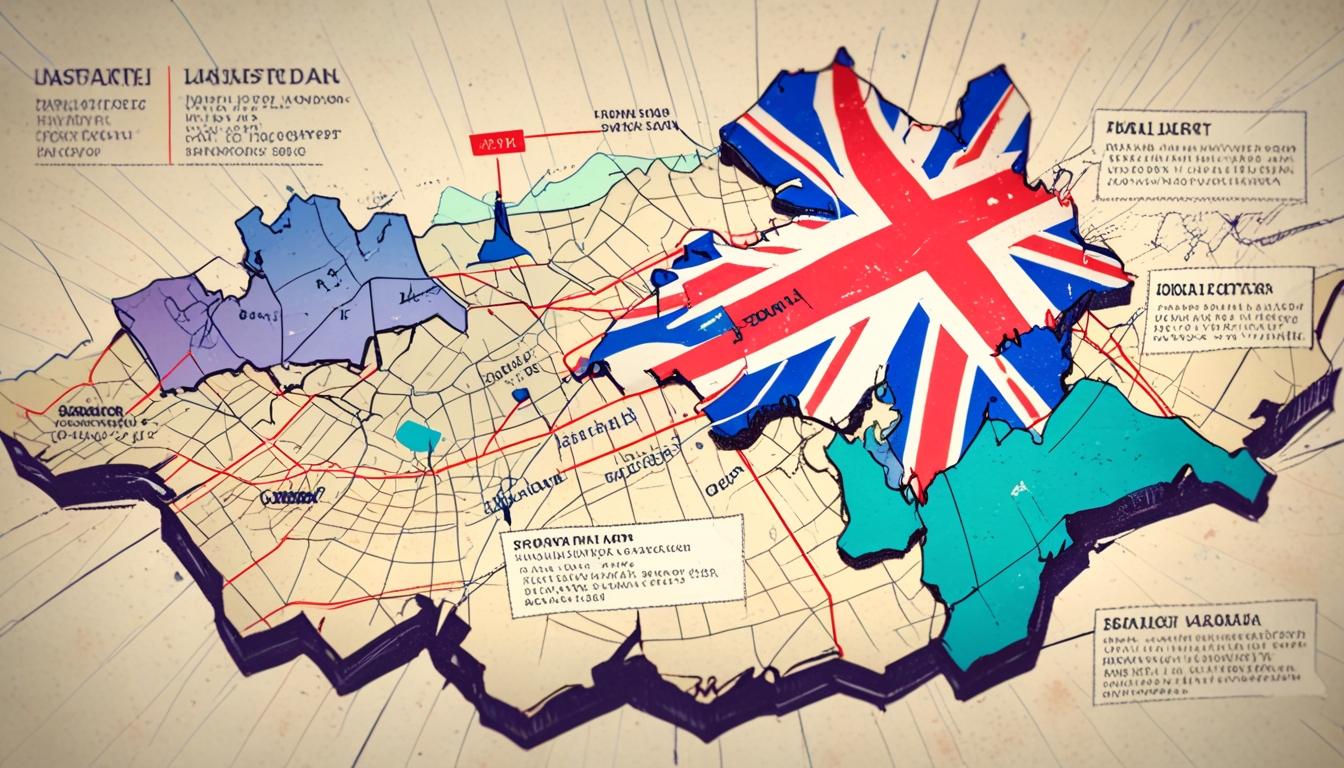The UK government’s sharp rise in visa salary thresholds and new language requirements risk worsening staff shortages in healthcare and engineering, exposing frailties in Boris Johnson’s administration as opposition parties push for stricter controls amid soaring net migration.
The recent maneuvers by the UK government to tighten migration rules signal a desperate attempt to regain control over an increasingly fractious political landscape, stirred by opposition forces that are gaining traction. The Prime Minister’s latest announcement, cloaked in promises of stricter immigration policies, emerges as a feeble response to the rising influence of parties advocating for a more robust stance on immigration—highlighting an unsettling reality for the current administration.
Central to these new measures is a pronounced emphasis on English language proficiency, mandating that immigrants, including spouses and dependants of foreign workers, pass a language test. This aligns disturbingly with Labour leader Sir Keir Starmer’s assertion that newcomers must earn the “privilege, not right” to reside in the UK. Yet, this framing only serves to mask a broader failure to address the concerns of ordinary citizens who feel overshadowed by mismanaged immigration, allowing opposition voices to flourish.
Moreover, the government’s strategy includes a drastic raise in salary thresholds for skilled worker visas, climbing from £26,200 to an exorbitant £38,700. Home Secretary James Cleverly claims this adjustment could eliminate 300,000 potential migrants, but such rhetoric glosses over the critical shortages in essential sectors. This misguided policy threatens to cripple industries dependent on foreign expertise, particularly in health care and engineering, where the demand is insatiable.
Early statistics reveal a staggering 76% drop in applications for health and social care visas in 2024, which should ring alarm bells for a government already grappling with public service limitations. Industry leaders are sounding the alarm, cautioning that these misguided changes will exacerbate existing staffing crises, all while neglecting the dire need for genuine investment in working conditions and funding in the care sector.
Meanwhile, the Labour party’s rhetoric appears to advocate for a balanced immigration approach—tying immigration policy with workforce training to fortify British labor. However, this abstract commitment falls short without concrete actions to mitigate the fallout from restrictive immigration rules, leaving many critical sectors vulnerable.
As Britain reels from rising net migration numbers, now peaking at an astounding 745,000 in 2022, the Prime Minister’s promise to slash net migration is little more than political posturing. The reality remains that ongoing pressures within public services and the economy render these promises hollow.
In the midst of these turbulent domestic challenges, the UK’s responses to international developments must also be scrutinized. Ukrainian President Volodymyr Zelensky’s readiness to negotiate with Russian leaders highlights a crucial moment for global stability, raising pertinent questions about the UK’s role and responsibilities on the international stage.
As the nation gears up for an overhaul of its migration policies amid swirling domestic and global issues, the narrative surrounding immigration, economic stability, and international diplomacy will become an increasingly compelling battleground in the months ahead.
Source: Noah Wire Services
- https://www.bbc.com/news/articles/cdd206gnp85o – Please view link – unable to able to access data
- https://www.bbc.com/news/uk-politics-67612106.amp – The UK government has introduced measures to reduce net migration, including increasing the minimum salary for skilled overseas workers from £26,200 to £38,700. Home Secretary James Cleverly stated that these changes would prevent 300,000 people from being eligible to move to the UK in future years. The plan also includes banning care workers from bringing family dependants and ending the practice of paying workers on the shortage occupation list 20% less than UK citizens. These measures aim to address concerns over high immigration levels and their impact on public services.
- https://www.ft.com/content/ef67f882-3435-4c53-a00c-e0b7e15a572d – Since the beginning of the year, the number of UK visa applications for health and social care workers and students’ dependants has significantly decreased, indicating the impact of Rishi Sunak’s new immigration policies. These changes, aimed at reducing net migration, were announced by Home Secretary James Cleverly in December. Key modifications include preventing social care workers from bringing families and increasing the minimum salary threshold for skilled worker visas. Additionally, international postgraduates can no longer bring dependants. Subsequently, health and care visa applications fell by 76% in the first four months of 2024, and student dependant visas fell by 79%. Conversely, skilled worker visa applications rose by 41%, likely due to employers rushing applications before higher costs took effect. While universities warned about the financial threat to the sector due to restrictions, the government decided to maintain the graduate visa route, despite calls for stricter measures. The annual migration data for 2023 is expected to show a continued trend of high immigration levels.
- https://www.ft.com/content/392f1411-6cee-468e-802a-72a5652f9650 – Labour leader Sir Keir Starmer has pledged to cut work-related immigration to the UK, ensuring visa rules are linked to training more British workers. Starmer aims to ban employers violating employment laws from hiring overseas workers and connect immigration policy with skills training to address industry demands. Labour supports the current Conservative measures reducing immigration, such as restricting family accompaniment for students and increasing salaries for skilled work visas, which have led to a decrease in immigration. Labour’s shadow home secretary, Yvette Cooper, seeks to leverage visa use to boost UK workers’ training, particularly in health, social care, IT, construction, and engineering sectors. Business groups express concerns that such policies could hurt the economy and deter foreign investment. They argue that fixing the skills system is crucial before reducing immigration. Critics highlight that increased immigration has been driven by public sectors like higher education and the NHS, suggesting more funding is needed to address these areas effectively.
- https://www.ft.com/content/24077686-e60a-443e-9674-30f601452d6b – More than a quarter of care workers recruited to the UK under a visa program were employed by companies that later lost their license to sponsor visas. Over 39,000 workers were impacted by measures aimed at curbing abuse of the visa system which was introduced in 2022 to address staffing shortages in the care sector. Approximately 150,000 care workers arrived in the UK by late 2023, contributing significantly to the rise in immigration post-pandemic. Many faced exploitation, including underpayment and lack of promised work. The Home Office revoked over 470 sponsorship licenses in response to these abuses. Recent changes to immigration rules now require employers to prioritize hiring international workers already in England before recruiting from abroad. However, care sector representatives argue that this does not address the underlying issues of underfunding and poor commissioning practices. Many affected workers need substantial support to return to work due to the trauma caused by exploitation and job loss.
- https://www.apnews.com/article/uk-reducing-immigration-new-rules-f617a8ab03f1bd9ad070a75677aacc43 – The British government announced tough new immigration rules aimed at reducing the number of people moving to the UK each year by hundreds of thousands. Home Secretary James Cleverly stated that from the spring of 2024, prospective immigrants will have to earn £38,700 to get a skilled worker visa, up from £26,200. British citizens who want to bring their foreign spouse to Britain will have to earn the same amount. Health and social care sectors, which are highly reliant on immigrant staff, are exempt from the salary rule. However, care workers from overseas will no longer be able to bring dependent relatives with them to Britain, leading to concerns in the industry that fewer will want to come. The government also said it would scrap a rule that lets employers in sectors on a ‘shortage occupation list’ pay immigrant workers 20% less than UK citizens. Starting in January, most foreign graduate students also will no longer be able to bring family members to the UK. Cleverly said the new measures would reduce by 300,000 the number of people eligible to move to Britain in future years. Revised figures released last month by the Office for National Statistics said net migration to the UK was a record 745,000 in 2022. Net migration in the 12 months to June 2023 decreased to 672,000.
- https://www.cnn.com/2022/03/20/politics/zelensky-putin-ukraine-negotiations-war-cnntv/index.html/ – Ukrainian President Volodymyr Zelensky expressed his readiness for negotiations with Russian President Vladimir Putin, stating that without negotiations, the war could escalate into a third World War. He emphasized the necessity of dialogue to end the conflict and indicated his willingness to use any format or opportunity to engage with Putin. This statement underscores Zelensky’s commitment to seeking a peaceful resolution to the ongoing war in Ukraine, highlighting the critical role of negotiations in preventing further escalation and achieving peace.
Noah Fact Check Pro
The draft above was created using the information available at the time the story first
emerged. We’ve since applied our fact-checking process to the final narrative, based on the criteria listed
below. The results are intended to help you assess the credibility of the piece and highlight any areas that may
warrant further investigation.
Freshness check
Score:
8
Notes:
The narrative references recent UK immigration policy changes and statistics from 2022 and 2024, suggesting it is relatively current. However, the absence of newer statistics or events might indicate slight staleness.
Quotes check
Score:
7
Notes:
The narrative includes a quote from Labour leader Sir Keir Starmer, but lacks specific attribution. Without verifying the original source, this quote’s authenticity is uncertain.
Source reliability
Score:
9
Notes:
The narrative originates from a reputable news outlet, the BBC, known for its journalistic integrity and rigorous reporting standards.
Plausability check
Score:
8
Notes:
The claims about immigration policy changes and their impacts are plausible given current political and economic pressures in the UK. However, specific statistics like the 76% drop in health and social care visa applications need verification for full credibility.
Overall assessment
Verdict (FAIL, OPEN, PASS): PASS
Confidence (LOW, MEDIUM, HIGH): MEDIUM
Summary:
The narrative is generally plausible and reliable, given its source and context. However, specific details like statistics and unattributed quotes require further verification to enhance confidence.













